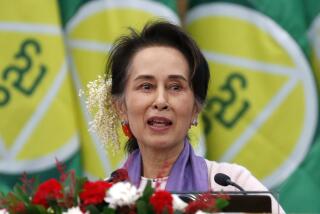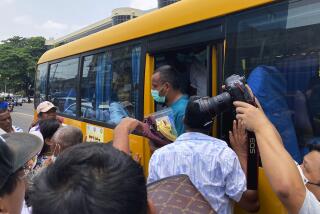Burma Bars Troops, Rebels, Others From Ballot in 1990
- Share via
BANGKOK, Thailand — Burmese military authorities laid out the law Thursday for next year’s promised democratic elections, barring the candidacies of soldiers, insurgents and government workers.
Five months after it took power in a bloody crackdown on anti-government protests, the junta headed by Gen. Saw Maung distributed the draft election procedures to political parties and community organizations. Excerpts of the draft were broadcast Wednesday by official Rangoon Radio.
Immediate reaction appeared positive. Aung San Suu Kyi and Tin Oo, two prominent political figures, said they see no major problems with the law and its restriction on candidates from the military and civil service, which have provided the base of power for 25 years of one-party rule in Burma.
Suu Kyi, however, complained that a fair election will be impossible unless the junta loosens its controls on campaigning. Her rallies outside the capital have been disrupted by troops. Junta spokesmen insist that the security situation in Burma, where an estimated 2,000 or more demonstrators died in last summer’s violent protests, remains too tense to permit large gatherings.
Under the electoral provisions announced by radio, the official campaign for National Assembly elections will last three months. The minimum age for voters was set at 18. But the draft law, which may be amended by the Election Commission through March 31, makes no provisions for a new constitution, and it does not spell out how power would be transferred from the military to a civilian government.
Saw Maung’s regime promised democratic, multi-party elections when it took over from a discredited civilian government last September, but it was not until last month that it set a date, and even then the balloting was put off for another 14 months.
Tentatively, Burmese will get the elections that they demanded in May, 1990.
Registration of political parties commenced shortly after the junta took power, and 233 had taken out papers by the first of the week, which does not necessarily indicate an explosion of interest in democracy.
“I don’t expect all these parties are going to the polls,” Suu Kyi, considered by diplomats to be the front-runner at this early stage, told a Western news agency reporter in Rangoon. Instead, she explained, most will coalesce into political fronts to back a slate of candidates on the ballot.
More to Read
Sign up for Essential California
The most important California stories and recommendations in your inbox every morning.
You may occasionally receive promotional content from the Los Angeles Times.













